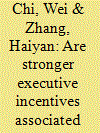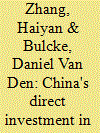|
|
|
Sort Order |
|
|
|
Items / Page
|
|
|
|
|
|
|
| Srl | Item |
| 1 |
ID:
093850


|
|
|
|
|
| Publication |
2010.
|
| Summary/Abstract |
This study examines whether firms incorporated in mainland China benefit from cross-listing in Hong Kong, China. The Hong Kong Stock Market has more stringent rules regarding corporate governance and a better system of investor protection than the mainland market. Hong Kong companies generally provide strong incentives to executives via equity-based compensation. Have cross-listed companies learned from Hong Kong firms about adopting these strong executive incentives? The evidence from this study suggests that changes in top executive compensation are more sensitive to sales growth in cross-listed firms than they are in mainland firms without cross-listing. However, compared to Hong Kong firms, cross-listed firms are less sensitive to stock returns. Further, this study shows that it is necessary to differentiate between state-owned companies and private companies, as cross-listing may have a greater impact on executive incentives in state-owned companies than it does in private companies.
|
|
|
|
|
|
|
|
|
|
|
|
|
|
|
|
| 2 |
ID:
129645


|
|
|
|
|
| Publication |
2014.
|
| Summary/Abstract |
While China is fast becoming an important outward direct investor, its companies are showing an increasing interest to locate in Europe and the European Union (EU). It has been suggested that this can partly be explained by the more lenient attitude of the European countries compared to the US, where some acquisitions were abandoned when they ran into political opposition based on security concerns. Yet, also in Europe, the media follow rather closely each new Chinese entry, and certain politicians have started to criticise the take-over of technology-oriented companies, especially by Chinese state-owned firms. Against the background of a very open foreign direct investment (FDI) policy as measured by OECD FDI Restrictiveness Index for the EU and the individual countries, an overview is given of the pre- and post-establishment obstacles to direct foreign investment. Also, the EU policy measures that directly or indirectly deal with incoming direct investment are discussed. Within the context of the EU competition policy and the merger regulation, the EU Commission has cleared five cases of take-over by Chinese state-owned enterprises. Although the Lisbon Treaty authorises the EU Commission to take charge of investment policy as part of the EU commercial policy, it will take time to realise this. If the announced negotiations about an investment treaty between China and the EU could work out the necessary balance, it would be an important step in achieving more reciprocity between their respective investment regimes.
|
|
|
|
|
|
|
|
|
|
|
|
|
|
|
|
| 3 |
ID:
128417


|
|
|
|
|
| Publication |
2014.
|
| Summary/Abstract |
Increasing use of energy has helped to stimulate China's economy. Despite central planning, China has great differences in economic development, energy endowment and energy consumption across its regions. This paper uses the structural decomposition approach to uncover the regional disparities in energy consumption from 1987 to 2007. We also examine six possible key factors for the change in energy consumption by region. We find that final demand change outpaced efficiency improvements to drive up energy use in all regions between 1987 and 2007. More surprisingly, from 2002 to 2007, it appears that changes in production structure enhanced energy consumption in most regions. China produced more energy-intensive goods for capital investment and export. We contend that improving the energy efficiency of key energy-intensive sectors would lead a significant decline in energy intensity. Energy, directly or indirectly, is flowing from Northwest, Central and North China to coastal regions. Regional-specific policies should be designed to promote production structure change and curb energy demand.
|
|
|
|
|
|
|
|
|
|
|
|
|
|
|
|
|
|
|
|
|